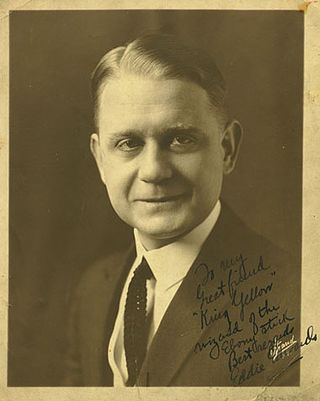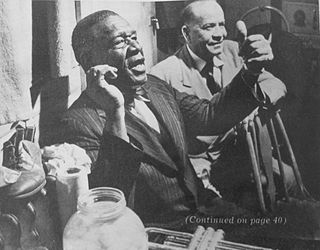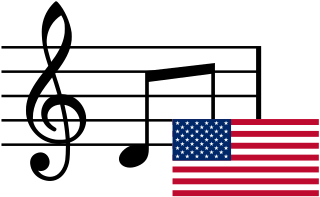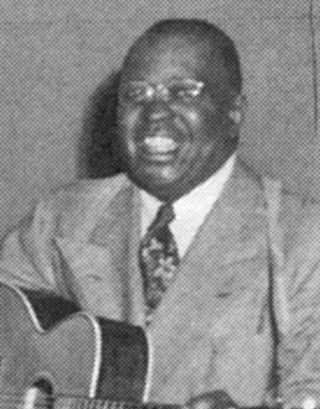
Ferdinand Joseph LaMothe, known professionally as Jelly Roll Morton, was an American ragtime and jazz pianist, bandleader, and composer of Louisiana Creole descent. Morton was jazz's first arranger, proving that a genre rooted in improvisation could retain its essential characteristics when notated. His composition "Jelly Roll Blues", published in 1915, was one of the first published jazz compositions. He also claimed to have invented the genre.

Joseph Nathan "King" Oliver was an American jazz cornet player and bandleader. He was particularly recognized for his playing style and his pioneering use of mutes in jazz. Also a notable composer, he wrote many tunes still played today, including "Dippermouth Blues", "Sweet Like This", "Canal Street Blues", and "Doctor Jazz". He was the mentor and teacher of Louis Armstrong. His influence was such that Armstrong claimed, "if it had not been for Joe Oliver, Jazz would not be what it is today."

Edward "Kid" Ory was an American jazz composer, trombonist and bandleader. One of the early users of the glissando technique, he helped establish it as a central element of New Orleans jazz.

Jimmie Noone was an American jazz clarinetist and bandleader. After beginning his career in New Orleans, he led Jimmie Noone's Apex Club Orchestra, a Chicago band that recorded for Vocalion and Decca. Classical composer Maurice Ravel acknowledged basing his Boléro on an improvisation by Noone. At the time of his death Noone was leading a quartet in Los Angeles and was part of an all-star band that was reviving interest in traditional New Orleans jazz in the 1940s.

Edwin Branford Edwards was an early jazz trombonist who was a member of the Original Dixieland Jass Band.

Tom P. Brown, sometimes known by the nickname Red Brown, was an American dixieland jazz trombonist. He also played string bass professionally.

Alphonse Floristan Picou was an important very early American jazz clarinetist, who also wrote and arranged music. He was born and died in New Orleans, Louisiana.

New Orleans Records was an American record label based in New Orleans, Louisiana and active from 1949 until the early 1980s. Originally founded by Orin Blackstone in 1949, it was revived by Clive Wilson in 1972. The label specialized in New Orleans jazz.

Music in the United States underwent many shifts and developments from 1900 to 1940. The country survived both World War I and the Great Depression before entering World War II in December 1941. Americans endured great loss and hardship but found hope and encouragement in music. The genres and styles present during this period were Native American music, blues and gospel, jazz, swing, Cajun and Creole music, and country. The United States also took inspiration from other cultures and parts of the world for her own music. The music of each region differed as much as the people did. The time also produced many notable singers and musicians, including jazz figure Louis Armstrong, blues and jazz singer Mamie Smith, and country singer Jimmie Rodgers.

Big Jim Robinson was an American jazz musician, based in New Orleans, renowned for his deep, wide-toned, robust "tailgate" style of trombone playing, using the slide to achieve a wide swoop between two notes and rhythmic effects.

Kenneth Colyer was an English jazz trumpeter and cornetist, devoted to New Orleans jazz. His band was also known for skiffle interludes.

Louis Hall Nelson was an American jazz trombonist.
Joseph Hilton "Nappy" Lamare was an American jazz banjoist, guitarist, and vocalist.
Arthur Frank Hazel, better known as Monk Hazel, was a jazz drummer and cornetist.

Lionel Charles Ferbos was an American jazz trumpeter. He was from New Orleans, Louisiana.
Henry "Kid" Rena was an American jazz trumpeter, who was an early star of the New Orleans jazz scene.

Arthur Budd Scott was an American jazz guitarist, banjoist and singer. He was one of the earliest musicians associated with the New Orleans jazz scene. As a violinist he performed with James Reese Europe's Clef Club Orchestra at a historic 1912 concert at Carnegie Hall, and the following year worked with Europe's ensemble on the first jazz recordings on the Victor label.
Frank Froeba or Froba was an American jazz pianist and bandleader.
Frank "Big Boy" Goudie was an American jazz trumpeter, alto and tenor saxophonist and clarinetist.
Dixieland jazz, also referred to as traditional jazz, hot jazz, or simply Dixieland, is a style of jazz based on the music that developed in New Orleans at the start of the 20th century. The 1917 recordings by the Original Dixieland Jass Band fostered awareness of this new style of music.














